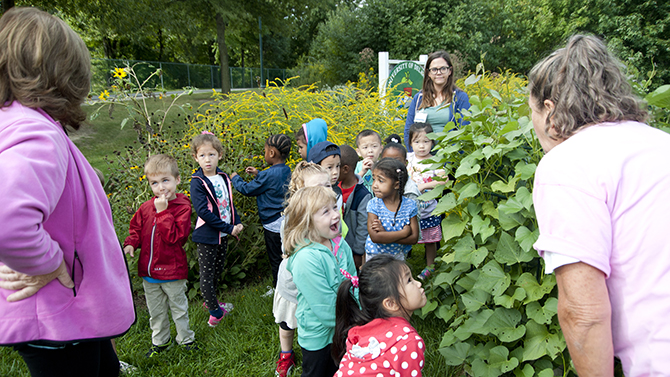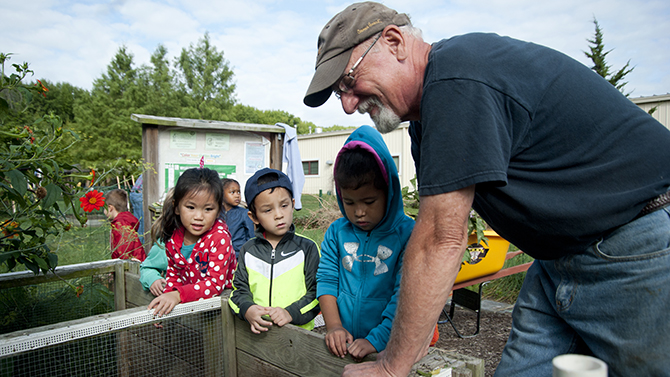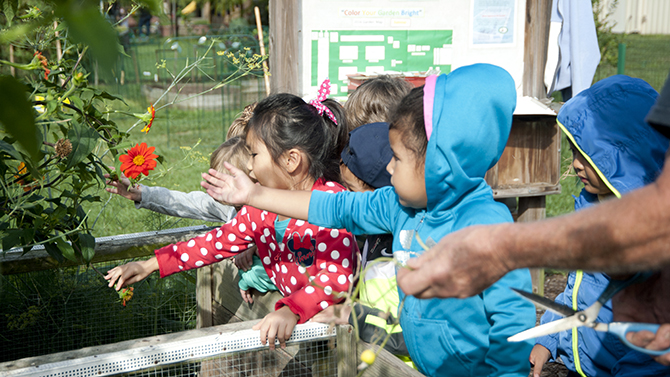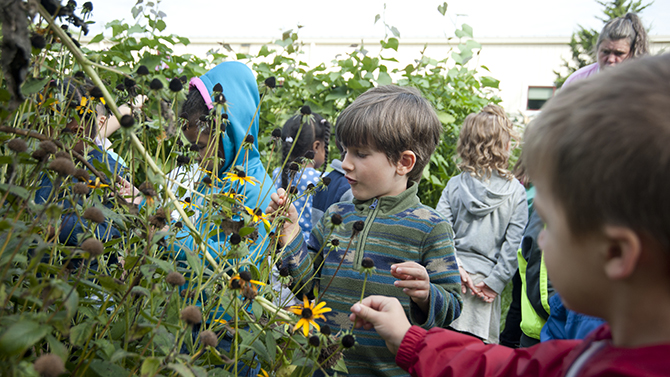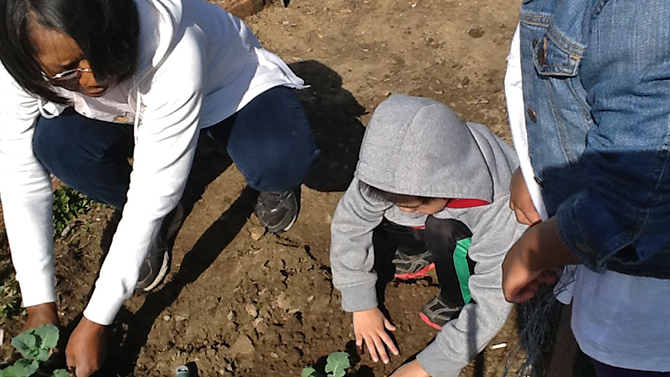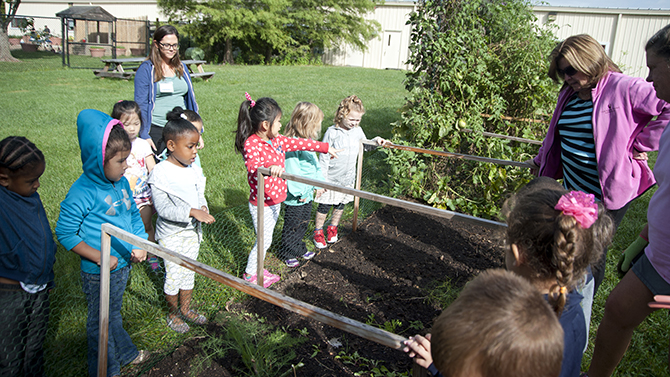

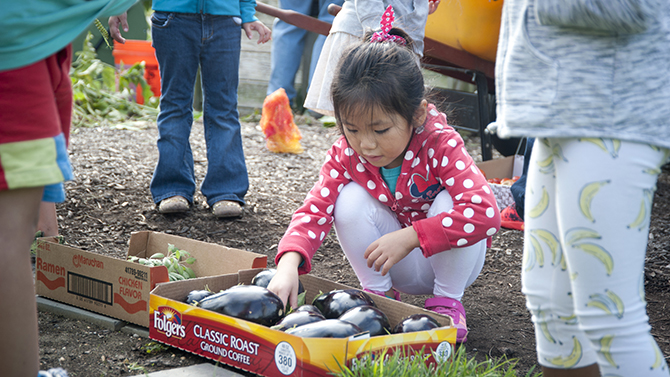
Living classroom
Photos by Wenbo Fan October 04, 2016
Master Gardeners teach children at ELC about plants, wildlife
Since its inception in 2009, the Master Gardeners’ Vegetable and Fruit Demonstration Garden located next to Newark’s James Hall Trail has served as an outdoor classroom, educating members of the community about the importance of plants and wildlife.
One of the most beneficial ways that the garden has been used has been to educate local youths from the University of Delaware Early Learning Center (ELC) and the UD Laboratory Preschool, located next door to the New Castle County Cooperative Extension building.
Now, thanks to a partnership with the ELC’s prekindergarten program, the UD Master Gardeners will continue that education. The partnership was initiated by Phyllis Roland and Cathy Coppol, both ELC teachers in the pre-kindergarten class. Their goal is to help children learn how to increase the sustainability of the ELC garden, increase food production, and share fresh produce with the schools and local community.
Roland got the idea when she and her class passed the demonstration garden while walking along the James Hall Trail. She thought it would be “nice to partner with [the Master Gardeners] so they could help us to learn more about gardening. I stopped over to see Pat [Pat Cavanaugh, a Master Gardener], and she agreed to come and look at our garden and talk about their garden.
One of the things that we’re really excited about in our project is to help the children understand how to provide resources to the community. The Master Gardeners contribute to the area Food Bank, so we got on board with that. We bring some of the produce from our garden to contribute and add to what they’re harvesting,” said Roland, who added that they’ve grown broccoli, string beans, lettuce, cucumbers, zucchini, radishes, beans and carrots in the garden. They also have a flower garden and grow herbs.
Roland’s class visits the demonstration garden every Monday morning. The Master Gardeners talk about their gardening projects and introduce the children to processes such as composting, pollination and cultivation, and to various wildlife that help to enhance the garden.
Lynn Hessler, a Master Gardener, shared about a time when the children encountered a monarch butterfly.
“They were able to touch it and we showed them how to hold it and the butterfly wouldn’t fly away. It must’ve thought, ‘I’ve got food, I’ve got water, people love me. Why would I leave?’ So we all sat there and watched it,” said Hessler.
The most beneficial aspect of the partnership has been providing students the experience of growing food from seed to fruit.
“It helps with their social, emotional development,” said Roland. “They have an opportunity to try fresh produce that they may not get at home and we bring food into the classroom. We cook with them and they understand how to process the environment for planting, maintaining the garden, and then eventually harvesting the fruit. It helps to generate excitement and they’re not thinking everything is just instant gratification but they’re looking at processes and I think they’ve grown a lot in that experience.”
Peggy Bradley, ELC director, said that it’s been “a lovely partnership” between the ELC and the Master Gardeners.
“We really appreciate their contribution to our program and it’s a very nice intergenerational connection for our children, as well as an educational connection,” said Bradley.
Bradley also said that research shows that there is “so much cognitive development that can come out of those sensory experiences of gardening. From the beginning planting the seed stage all the way through the picking and smelling and tasting.”
Garden Gals
The demonstration garden is currently being overseen by Cavanaugh, Hessler, Sally Reiss and Ruth Zorzi, all of whom are Master Gardeners and are known collectively as the “Garden Gals.”
There are a total of 27 Master Gardeners who help out with the garden and have interacted with the groups from the ELC and the UD Laboratory Preschool. Zorzi said she enjoys being able to show the children who visit the garden where their food comes from.
“You’re not just getting something out of the supermarket, you see that it grows out of the soil and you can take it in the kitchen and cook it and taste it and get different varieties,” said Zorzi.
Reiss said that it is one thing for a student to learn about science from a book in a classroom but it is another to give them a hands on learning experience at a young age.
“When they can see how the plants actually grow, it’s just the wonder of how all plants can be so different and we can show the kids stuff about caterpillars and talk about how they’re going to become butterflies. You just never know with kids what they’re going to remember but it’s a nice hands-on experience that they otherwise wouldn’t get,” said Reiss.
When they travel to the ELC, the Master Gardeners teach the children how to do things such as pick flowers, beans, cucumbers and tomatoes so that they aren’t pulling out the whole plant.
“They were all involved with picking the marigolds and taking them home for their parents and then a couple of the boys decided it was great fun to throw the marigolds like balls. Of course, by doing that, they were spreading the seeds so we said, ‘OK, this is a good thing,’” said Cavanaugh.
Gail Hermenau, who led the installation of the garden back in 2009 after helping to create a demonstration composting area, said the garden has been used by the ELC since the very beginning.
“When I was there on a regular basis, people from the James Hall Trail would come over, and we engaged a lot of people in the garden and it was just sort of a regular thing that we always worked with the children from Fran Walls’ classroom so I’m really glad that they still are doing different workshops with the kids,” said Hermenau.
“We would bring vegetables back into their class and show them the different insects and caterpillar larvae, the chrysalis if we could find them – whatever we could use that was taking place. It is like a living classroom out there for children and adults,” said Hermenau.
The Master Gardeners design and maintain gardens and a compost demonstration site for the purpose of teaching good horticultural practices. Those interested should stop by the demonstration site at the Cooperative Extension office, 461 Wyoming Road in Newark on the University of Delaware campus to learn more about growing fruit and vegetables, composting and plants native to our region.
Those interested in becoming a Master Gardener should contact Carrie Murphy, Extension Educator, Master Gardener Coordinator at cjmurphy@udel.edu or 302-831-COOP.
Young gardeners at work.
Wenbo Fan
New Castle County Master Gardeners work with students at UD's Early Learning Center.
Wenbo Fan
Youngsters enjoy a trip to the garden.
Young gardeners check the plants.
Phyllis Roland works with a young gardener.
Wenbo Fan
A trip to the garden for youngsters.
Contact Us
Have a UDaily story idea?
Contact us at ocm@udel.edu
Members of the press
Contact us at 302-831-NEWS or visit the Media Relations website

